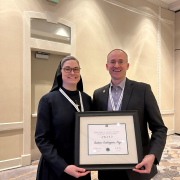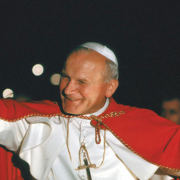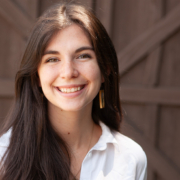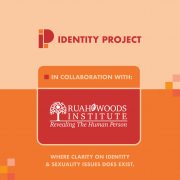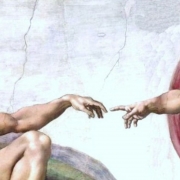Gift, Self-gift, and the Meaning of Life — Part 2
Last month, I reflected on the logic of gift and how it is a golden thread woven throughout Pope St. John Paul II’s thought, especially his Theology of the Body. We saw how all of creation, including man, depends on God’s loving gift of existence at every moment. We also saw how the logic of gift even describes the inner life of God Himself who is an eternal exchange of love between Father, Son, and Holy Spirit. Let us extend those reflections to explore what the logic of gift has to say about our vocation and the role of the human body in revealing these mysteries.
To say that the very being of man is a gift to him from the Creator means that the logic of gift marks “the very essence of the person” (TOB 14:2). If gift characterizes the very being and essence of man, then his ultimate fulfillment must be found through freely making a gift of himself to others. According to Pope St. John Paul II, man cannot find fulfillment in isolation. Rather, he can find fulfillment “only by existing ‘with someone’ — and, put even more deeply and completely, by existing ‘for someone’” (TOB 14:2, italics in original).
This “existing for” another is what “self-gift” means. We make a gift of self whenever we engage in some act of self-sacrifice for others. Each of these acts of generosity in which we seek the good of the other before ourselves are acts of self-giving that contribute to the fulfillment of our being. However, the fullest expression of self-gift is when we make a “total” gift of self. Such “total” giving is properly called a “spousal” gift of self, whereby we enter a permanent, exclusive relationship of belonging entirely to another. Marriage is the primordial “place” given to us by God for such a spousal gift of self.
The human body bears witness to all of this. Our bodies show us that our life is a gift since we come from another and depend on others to exist. We are conceived and gestated in our mother’s womb, born of her body, and physically nurtured by her and others as we grow. Indeed, human beings are remarkable in the visible world in that the human body takes an extremely long time to mature and reach a level of relative independence. We need the physical and emotional care of others in order to survive to adulthood, only to eventually decline back into dependence on the physical care of others. Throughout, our bodies bear the signs of our relational history. Our belly buttons remind us of our mothers’ nurturing gift of self in her womb. Our physical features remind us of the gift of life we receive from our parents and ancestors who came before. All of this led Pope St. John Paul II to exclaim, “This is the body: a witness to creation as a fundamental gift, and therefore a witness to Love as the source from which this same giving springs” (TOB 14:4, italics in original).
Even more, we discover in our bodies our sexual identity as male or female. This sexual difference only makes sense when we think of the two in relation to each other. It shows us that man and woman are made for each other. Our maleness and femaleness enable us to make a “total” gift of self by which the two “become one flesh” through marital union. Pope John Paul II coined the term the “spousal meaning of the body” to refer to the human body’s “power to express love: precisely that love in which the human person becomes a gift and — through this gift — fulfills the very meaning of his being and existence” (TOB 15:1, italics in original).
What the saintly pope is telling us is that since every human person is a gift, the meaning of life is to give ourselves away as a gift to others. When we live a life of total self-giving, we act in accord with God’s wise and loving plan, the very structure of our being and essence, and the deepest desires of the human heart. I invite all of us to reflect on how we can embrace this way of life more fully as we continue our journey through Theology of the Body.
Note: This article is part of a series of reflections on Pope St. John Paul II’s “Theology of the Body”.
Continue Reading: Gift, Self-gift, and the Meaning of Life — Part 3: The Spousal Meaning of the Body

Written by, Dr. Andrew Sodergren, M.T.S., Psy.D.,
Director of Ruah Woods Psychological Services
(Article originally published in The Catholic Telegraph, June 2022 Issue, the official magazine of the Archdiocese of Cincinnati)


